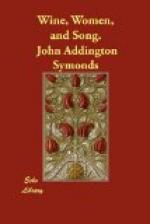Love flies all the world around:
Love in wanton wiles is wound:
Therefore youth and maid are
bound
In
Love’s fetters duly.
She
is joyless truly
Who no lover yet hath found!
All the night
in grief and smart
She must languish,
wear her heart;
Bitter is that
woman’s part.
Love is simple, Love is sly;
Love is pale, of ruddy dye:
Love is all things, low and
high:
Love
is serviceable,
Constant
and unstable:
Love obeys Art’s empery.
In this closed
room Love takes flight,
In the silence
of the night,
Love made captive,
conquered quite.
The next is singularly, quaintly musical in the original, but for various reasons I have not been able to adhere exactly to its form. I imagine that it is the work of the same poet who composed the longer piece which I shall give immediately after. Both are addressed to Caecilia; I have used the name Phyllis in my version.
THE INVITATION TO LOVE.
No. 36.
List, my girl, with words I woo;
Lay not wanton hands on you:
Sit before you, in your face
Gazing, ah! and seeking grace:
Fix mine eyes, nor let them rove
From the mark where shafts of love
Their flight wing.
Try, my girl, O try what bliss
Young men render when they kiss!
Youth is alway sturdy, straight;
Old age totters in its gait.
These delights of love we bring
Have the suppleness of spring,
Softness, sweetness, wantoning;
Clasp, my Phyllis, in their ring
Sweeter sweets than poets sing,
Anything and everything!
After daytime’s heat from
heaven
Dews on thirsty fields are given;
After verdant leaf and stem
Shoots the white flower’s diadem;
After the white flower’s bloom
To the night their faint perfume
Lilies fling.
Try, my girl, etc., da capo.
The poem, Ludo cum Caecilia, which comes next in order, is one of the most perfect specimens of Goliardic writing. To render its fluent, languid, and yet airy grace, in any language but the Latin, is, I think, impossible. Who could have imagined that the subtlety, the refinement, almost the perversity of feeling expressed in it, should have been proper to a student of the twelfth century? The poem is spoiled toward its close by astrological and grammatical conceits; and the text is corrupt. That part I have omitted, together with some stanzas which offend a modern taste.
PHYLLIS.
No. 37.
Think no evil, have no fear,
If I play with
Phyllis;
I am but the guardian dear
Of her girlhood’s
lilies,
Lest too soon her bloom should
swoon
Like spring’s
daffodillies.




